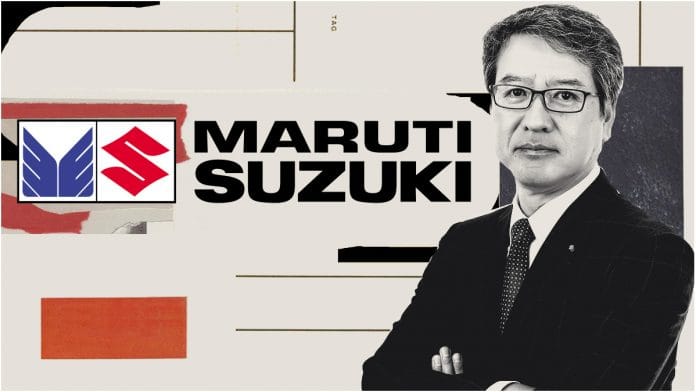New Delhi: Hisashi Takeuchi has taken over the reins of Maruti-Suzuki India Limited (MSIL) as Managing Director and Chief Executive Officer (MD & CEO).
In his first interaction with the Indian media, Takeuchi-san said development of the first Maruti EV was a work in progress, adding that a rollout of Maruti’s first electric car would only begin by 2025.
He further stated that one must look at the entire lifecycle and carbon costs of electric vehicles.
India’s largest carmaker by a fair margin, Maruti-Suzuki India Limited has been making cars that gave millions of Indians their first, and in some cases, only, experience of passenger cars. But despite having created immense shareholder wealth in the past two decades, the carmaker is facing severe headwinds.
Some of this is, at least in part, MSIL’s own doing.
Also Read: Maruti Suzuki launches new version of Ertiga
Challenges before Maruti-Suzuki
Unable to bring in a diesel engine that could adhere to strict emission norms posited by Bharat Stage-6 (BS VI), Maruti-Suzuki India Limited decided to stop making diesel-powered vehicles.
There is also the fact that despite the success of Vitara Brezza — its only Sports Utility Vehicle (SUV) — MSIL has been absent from the so-called ‘Creta’ segment, named after Hyundai’s runaway hit. The very same Creta has been printing money for Maruti-Suzuki’s rivals with more and more Indians opting for SUVs that now account for 40 per cent of the 2.5 million passenger cars sold in India each year.
As if things were not difficult enough already, the global shortage of semiconductors has added to the woes of the global automotive industry and MSIL is no exception.
The semiconductor shortage, coupled with the fact that it is now mandatory for passenger cars sold in India to be fitted with certain features that require additional electronics such as airbags and anti-lock brakes, along with customer preferences, including heads-up display units and smartphone connectivity, has resulted in MSIL’s order backlog touching 2,70,000 vehicles on this day.
What is working in Maruti’s favour?
This is not to say that Takeuchi-san does not have some things going in his favour as he himself admits. For example, Maruti-Suzuki India Limited’s order backlog is actually more vehicles than what all other carmakers in India, with the sole exception of Hyundai, sell in a year.
In a frank discussion with members of the media from Delhi, Hisashi Takeuchi said MSIL has boosted exports from the country as export specifications often require fewer semiconductors.
This, in addition to Maruti’s bet on Compressed Natural Gas (CNG)-powered vehicles, has proven to be a boon for the carmaker.
“The government has said that they plan to increase the number of CNG stations across India from around 3,500 today to 12,000 in the next couple of years, and that CNG is not only cheaper than petrol, it is also cleaner and will help us achieve our carbon reduction goals,” Takeuchi-san said.
It is also important to note here that MSIL is planning to launch more SUVs into the market.
While Takeuchi-san did not announce any timeframe for these launches, it is believed that a second-generation Brezza is on the cards, along with a competitor in the ‘Creta’ segment, expected to be launched later this year.
Having fallen behind its competitors, especially Korean carmakers and, increasingly, Tata Motors, Maruti-Suzuki India Limited is also ramping up the feature specifications on its vehicles, including adding heads-up displays on the new Baleno, six-speed automatic gearboxes with paddle-shifters on the new Ertiga, along with XL6 and additional safety features such as more airbags.
Takeuchi-san bats for ethanol blending in petrol
Takeuchi-san said he believed that the Indian government’s push towards increasing ethanol blending in petrol was a more viable solution in the short-term not just to reduce carbon emissions, but also to save on the import of fuel.
But things will not be easy for Maruti with the increasing popularity of SUVs having caught the small car manufacturer flat-footed. It remains to be seen whether new products will help MSIL regain its market share that has fallen to a multi-year low of just over 43 per cent.
Also, while Maruti’s CNG strategy has paid dividends, global gas prices have seen a dramatic hike after the onset of the Russia-Ukraine conflict as sanctions on Moscow have made Russian gas unpalatable, which is a huge problem given Russia’s dominant position in the global natural gas supply chain.
Takeuchi-san understands the scale of the task ahead of him, and, unlike previous Japanese chief executives at the helm of the country’s largest carmaker, his outreach to the media was perhaps a reflection of that knowledge.
(Edited by Amrtansh Arora)
Also Read: Olive green Maruti Gypsy to be history as Army seeks new 4×4 soft-top vehicle for operations






